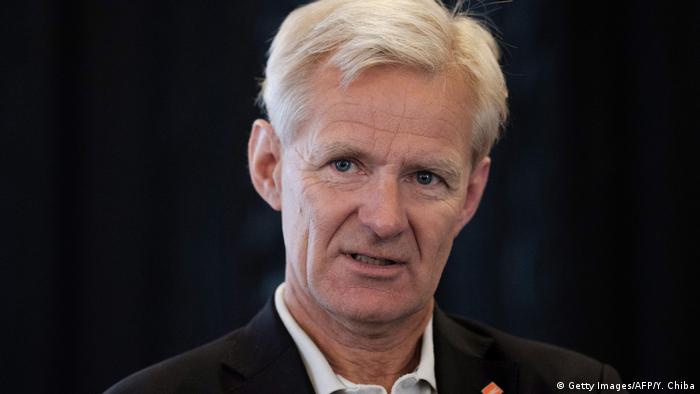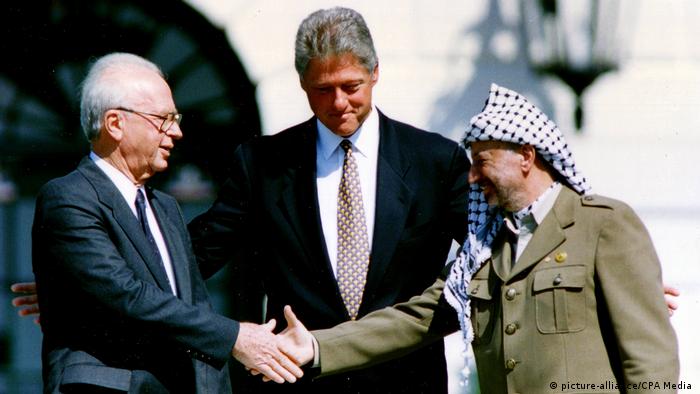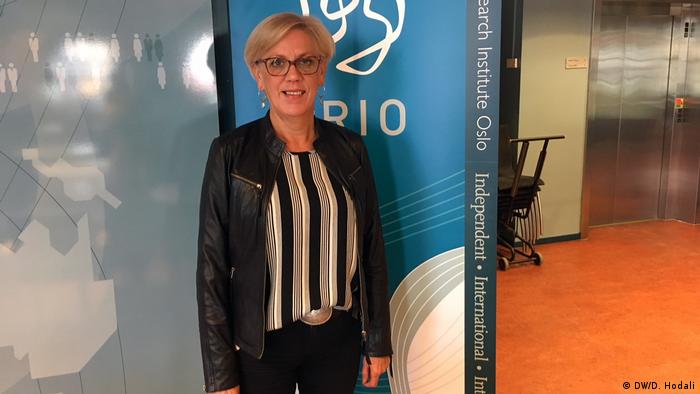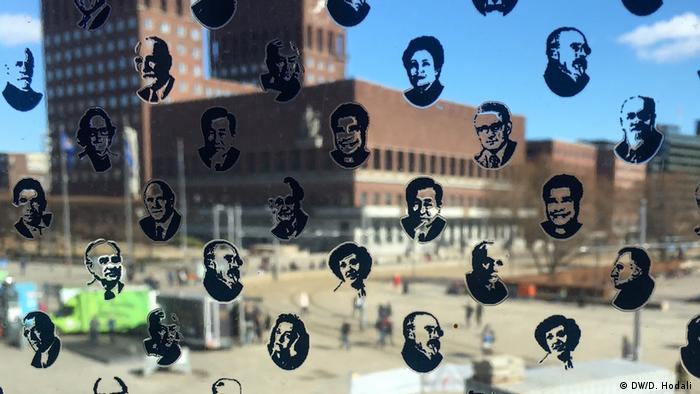25 years ago, the Israelis and the Palestinians signed the Oslo peace agreement. Many Norwegians celebrate the success of the Placement, even today, in Norway, could be from the beginning, not a neutral Mediator.

Israel’s foreign Minister Shimon Peres and Palestinian leader Yasser Arafat (1994)
Omitted, and well, as Jan Egeland describes the mood that prevailed between Israel and the Palestinian liberation organization (PLO), as both parties in 1993, when the Oslo peace talks came together. Egeland has experienced in his career, a lot of crisis calls and crisis countries. The Norwegian Pop Band Ylvis, has devoted to him even a song, in which she referred to him as a “peacekeeping machine,”.
His first major task, which was given to him at the time, with 36 years as a Deputy Minister of foreign Affairs, he remembers particularly well: He should make discussions between representatives of the Israeli government and the PLO in Oslo back rooms possible and align, as a facilitator, mediator, and supporter.
“The two parties have directly and alone spoken to each other. There were good people on both sides really,” recalls Egeland modest. As chief negotiator for Israel, the former Prime Minister Yitzhak Rabin and the Diplomat Uri Savir sat at the table. On the Palestinian side, PLO man, Ahmed Kureia took in addition to the then Palestinian President, Yasser Arafat, who was considered Israel a long time as a Terrorist, at the negotiating table.

First major task: Diplomat Jan Egeland was part of the Norwegian mediation team during the Oslo peace process
Egeland and the other members of the Norwegian facilitator team treated both parties with the same respect, he says: “We have them in the same cars picked up from the airport, you were sitting at the same tables, and were given the same attention”. Egeland also had the financial responsibility for the calls. “You have met, and we realized that they slowly began to trust,” says the Diplomat, who now heads the Norwegian Refugee Council and UN special coordinator for Syria. Step-by-step, I can see how the efforts to bring the warring parties closer to each other, to bear fruit.
Science Fiction in Washington
Nine months and many conversations later, it was suddenly as far as: representatives of the Israeli and Palestinian leadership agreed to a joint Declaration of principle on the way to the establishment of the Palestinian authority paved and the mutual recognition between Israel and the PLO. The Oslo agreement was designed.

The historic handshake between Yitzhak Rabin (li.) and Yasser Arafat (R.), but peace prevails until today
At once the long-awaited peace between the Israelis and the Palestinians seemed close enough to touch, as at 13. September gave in 1993 Israeli Prime Minister Yitzhak Rabin and Yasser Arafat, head of the PLO on the lawn of the White house, the hands, under the eyes of the world public. The then Norwegian foreign Minister Johan Jørgen Holst was to this historic gesture to witness the reconciliation of Two bitter enemies presented themselves as a Partner – through the support of Norway. The former U.S. President Bill Clinton thanked in his speech to the Scandinavian country. Norway, not the US as a long-time mediator, had made such a significant agreement possible.
Today, the scene of 25 years ago remembered on the lawn under the sun in Washington at a Science-Fiction Film, whose inventions will never become a reality: The two partners are so far apart, as they were rarely in the last few decades.
The Norwegians have a positive Outlook on “Oslo”
However, although it has been around since the Oslo agreements, never peace in the Middle East, the Oslo peace process for many Scandinavians today still an achievement. “This feeling is not as strong as earlier, but many Norwegians see the Oslo process as a success,” says Hilde scale. She is a historian at the University in Oslo, has directed the peace Institute PRIO in Norway’s capital from 1992 to 1993, and was commissioned in 2001 by the Ministry of foreign Affairs in order to investigate the role of Norway in the peace negotiations for the Middle East: What is the little Norway qualified at all to be in such a big conflict to interfere? Norway was neutral? These questions, Hilde balance at the time of its investigation.

Hilde Waage has studied the role of Norway in the peace process. She draws a critical conclusion
Numerous Attempts to direct contacts between the Israelis and the Palestinians had failed in the previous years. And then the successful Norwegian Delegation: Terje Rød-Larsen, a sociologist and former head of the sociological research Institute Fafo, with Connections to the Norwegian labour party was there at once. He was a Central intermediary figure, shuttled between the Israelis and the Palestinians in advance of the actual negotiations. As his wife Mona Juul, was a diplomat and specialist for the middle East conflict and worked together with Jan Egeland at the Ministry of foreign Affairs, and, of course, Johan Jørgen Holst, in 1993, Minister of foreign Affairs. “We were a very small group that knew of these talks, and we were very closely connected with both sides,” recalls Egeland.
The Norwegians will not be stumbled by chance in the peace process in the Middle East. Rather, their placement was the result of intensive contact care: “We had already reported a long time at all levels, good relations with Israel, but also direct contacts with the PLO”, Egeland. A particularly close relationship had always existed between the Norwegian and the Israeli labour party: “we had set ourselves after the end of the Cold war to the goal, to support confidence-building measures between the Israelis and the Palestinians.” For Norway it was, apparently, a logical consequence, to get involved in the middle East conflict.
Arafat wanted to use Norway’s connection to Israel
Despite Norway’s efforts, the PLO began to speak first to the Scandinavian country but it was. Because and not in spite of the close relationship to Israel, the late Palestinian President Yasser Arafat had taken the Scandinavian country back in 1979, as a suitable and attractive intermediaries in its sights. At that time, the United States asked Norway to supply Oil to Israel, because Iran stopped in the Wake of the Islamic Revolution, its oil Supplies, says Hilde scale. Oslo didn’t want to comply with this request but, before the PLO was informed.
The reason is that Norway had sent in 1978, about 1,000 troops to the observer mission UNIFIL in Lebanon. There is a civil war raged, the PLO was in there with your fighters in the middle. Out of concern about attacks on its own soldiers in Oslo informed the PLO leader. “Arafat had with oil Supplies to Israel, no problems,” says scales. On the contrary, He took advantage of the Situation and has asked Norway to open a conversation channel of Israel, explains the scientist. Arafat had used a friend of Israel, to a Palestinian state, and negotiate.

In Norway merged: Peres, Arafat and Rabin were awarded the 1994 Nobel peace prize
The country has a long Tradition in humanitarian aid and felt, therefore, called to commit themselves to the cessation of conflicts, for peace. That Norway has no colonial past and has always been economically independent, strengthened for many of the credibility.
Weak PLO – strong Israel
However, in the middle East peace process, nothing happened for a whole decade, actually. “Israel refused to talk with the PLO,” says Jan Egeland: “it was Only in 1992, when the Israeli labor party took over the government, was opened to Israel for our peace diplomacy.” The new government have recognised that there is no point in doing that to have a neighbor that is hateful.
Hilde Waage goes on in your evaluation one step further: The first Intifada was over just, Arafat had set in the Iraq-Kuwait war in 1990/91 on the wrong horse, Saddam Hussein, as a result, the support of Kuwait and lost, and was financially in trouble. “Arafat and the PLO were weak at this time,” says Hilde scale. Israel had known. We knew that Arafat would be willing to make more concessions,” is her conclusion: “Israel was the stronger party. The PLO, however, was under pressure. You wanted to appear on the stage and for a state of Palestine to fight.”
Asymmetrical power relations in the negotiations
In your Research, in 2001, she was investigated the question of how much the “maneuver room” in such an asymmetric power relationship is present, says the historian. They had come to the conclusion: very little. The Stronger always give the tone. “Norway has known and, on this point, yielded to, it knew that the negotiations had to be run for the benefit of Israel, because otherwise there would have been no agreement.” Therefore, Norway had not been just a “facilitator”, as Egeland says, but a “biased mediator”. And the agreements have cemented the asymmetry in the power relationship. The question of the Status of Jerusalem and the return of the Palestinian refugees was established prior to the negotiations the outside.

Views from the Nobel Center in Oslo – the city that wants to stand for peace
But Norway had meant well and as a “bridge-Builder”, says Libra is convinced. The country had believed that peace I leave with step-by-step.
That is, Israel was the stronger party, Egeland does not deny even today: “But an agreement is worse than no agreement at all? At that time, we have always said, an imperfect peace is better than a perfect war.”
Oslo – a place of peace
Although the Israelis and the Palestinians to live in peace with each other, have harvested the Norwegians, due to their role in international fame. Some critics of the peace talks speak, however, from the “export peace”. On Broadway Norway is celebrated today in a theatre piece with the title “Oslo” for his role. Not for nothing is awarded in Oslo, the Nobel peace prize: After the diplomatic breakthrough in the Middle East-the 1993 Oslo is also regarded as the capital of peace – at least for a while.